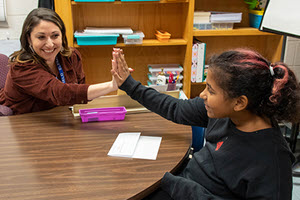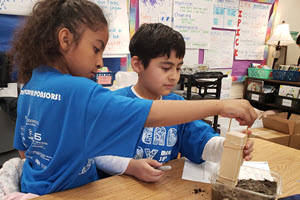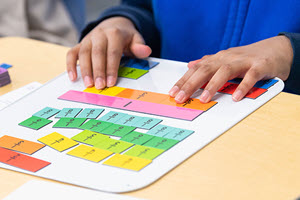Elementary and Secondary School Emergency Relief (ESSER) III - Plan for Safe Return
ESSER III - In-Person Instruction and Continuity of Services
Proposed ESSER Expenditures for 2023-24
In April 2023, Sloan Presidio, chief academic officer for FCPS, presented the proposed ESSER expenditures for the 2023-24 school year, the last year of ESSER funding. The proposed plan has nearly 80% of ESSER funds allocated to support student learning needs.
Some of the recommended projects for remaining funding include the continuation of special education teacher contract funding; funding school-based wellness and Social and Emotional Learning staff; academic interventions both at the school-level and through centrally assigned academic tutors; summer learning programs; school health coordinator; and a provider to address chronic absenteeism.
To date in FCPS, funds have been used toward expanded summer learning and tutoring services directed to the students with greatest academic need. More than 30,000 students participated in summer learning programs the last two years. And in a single year, about 40% of students deemed to need the highest degree of intervention saw marked improvement through high impact tutoring—a tutor working with small groups of students over a prolonged period of time.
Learn more in May 3, 2023, news release.
Background - Elementary and Secondary School Emergency Relief (ESSER III)
In the fall of 2021, FCPS received $188.8 million in Elementary and Secondary School Emergency Relief (ESSER III) funding to support the safe operation of schools and address the impacts of COVID-19 on students. FCPS has an intentional multi-year plan to ensure maximum value from the ESSER funding it received to assist with the post-pandemic recovery.
FCPS' Revised ESSER III Spending Plan (May 2023)
ESSER III focus areas include:
- Prevention and mitigation strategies to help keep schools open and safe.
- Academic services such as tutoring, after-school programs, and summer learning programs.
- Multilingual engagement to ensure all families are informed about their students and schools.
- Support for students’ social emotional needs, such as counselors, psychologists, social workers, and family liaisons.
See how ESSER funds are impacting students
TV Coverage
See story from WUSA with Glasgow MS Saturday School
FCPS Stories
 Small Group Work
Small Group Work
Roughly 35 students at an elementary school are receiving intervention services in reading; 40 or so receive similar small group help in math. The teachers are trained in instruction techniques to help students overcome any learning gaps that may have been exacerbated by the pandemic.
Educators say the program is paying off. For example, one student made more than two years of progress in his reading skills in one academic year.
Read more of the story: I Can Feel My Brain Getting Stronger:” ESSER Funds Help Students Make Big Gains In Small Group Work
Steam Lessons
 At one elementary school, students in pre-K through 6th grade are engaged in similar hands-on activities on STEAM Day. STEAM stands for Science, Technology, Engineering, Art and Math.
At one elementary school, students in pre-K through 6th grade are engaged in similar hands-on activities on STEAM Day. STEAM stands for Science, Technology, Engineering, Art and Math.
The goal of this special day is to expose students to the engineering design process, using their critical thinking and problem solving skills while collaborating and communicating in their teams. For example, kindergarten engineers design tiger shelters to give a tiger enough shade to keep them cool. Older students test soil composite to determine the best location to build skyscrapers on, shaking their model landscapes to mimic an earthquake.
Learn more: Full STEAM Ahead with ESSER Funding
No-Cost Tutoring
Students have unlimited access to 24/7, on-demand, online tutoring support services through Tutor.com at no cost to families. Students can connect online any time, any place, and in most K-12 subjects for however long they need. Tutoring may be on-demand and/or scheduled at a time convenient for the student and/or family.
Learn more: Tutor.com - Online Tutoring Services: Online tutoring by professional tutors at no cost to families
*Tutor.com is funded through a Virginia Department of Education ESSER III (rather than federal funding.
Board Games and More
In the library at Rocky Run Middle School in Chantilly, some students are playing new board games designed to boost critical thinking. Down the hall, five students go over how to add fractions, using magnetic fraction tiles. Others meet after hours with staff who help them organize their backpacks and binders to boost executive function skills that may have lapsed during the pandemic.
Read more of the story: Board Games, Backpacks and Boosting Academics: Rocky Run Middle School Taps Pandemic Funds to Assist All Students
Video - Game Room in Middle School
At one middle school, staff created a game room as a reward for students in connection with the school’s Positive Behavioral Interventions and Supports (PBIS) program. When students demonstrate PBIS attributes, such as respect, engagement, accountability, and positivity, they earn rewards. Funding for some of the game room equipment and staffing support for the room was provided by the ESSER III grant.
Section 1: Introduction
The purpose of the American Rescue Plan (ARP) Act Elementary and Secondary School Emergency Relief (ESSER) III Fund is to help safely reopen and sustain the safe operation of schools and address the impacts of COVID-19 on the nation’s students by addressing students’ academic, social, emotional, and mental health needs. This plan describes how Fairfax County Public Schools (FCPS) will maintain the health and safety of students, educators, and other school and division staff during the 2022-2023 school year.
For more information on the ESSER III grant, please watch this explanation video.
Section 2: Maintaining Health and Safety
FCPS has taken and will continue to take actions to ensure the health and safety of students, educators, and other school and division staff throughout the 2022-2023 school year.
Steps to maintain health and safety during full in-person instruction are listed on the Health and Safety Guidance Document including, but not limited to, health hygiene, cleaning and disinfecting, and student isolation guidance. This guidance is established in coordination with state and local health officials. The following additional supports and resources are also available.
COVID-19 Vaccine
The Fairfax County Health Department (FCHD) provides access to the COVID-19 vaccine and booster while encouraging community members to stay up to date with their vaccines. People 6 months and older are eligible to receive a COVID-19 vaccine. Everyone 5 years and older is eligible for a booster dose, some people are eligible for additional booster doses.
The regulation regarding vaccine requirements for FCPS Employees can be read here.
Section 3: Continuity of Services
FCPS has taken and will continue to take actions to ensure continuity of services, including but not limited to services to address students’ academic needs and students’ and staff's social, emotional, mental health, and other needs. FCPS is committed to continuity of learning during the 2022-23 school year and the school division is using layered prevention strategies to do everything possible to ensure our schools remain safe, healthy and open. Our plan is to remain open using these strategies unless directed otherwise by health officials or Executive Order. A plan is in place to ensure continuity of learning in the event health authorities or an Executive Order require a temporary closure to protect the health of students, staff, and the community.
FCPS describes academic plans in detail here.
Details for services are described below:
Recovery Services
Recovery Services are available to students with disabilities whose teams determined there remains a significant educational impact due to the COVID-19 school closure and virtual learning. Recovery Services are designed to address learning gaps and are determined by IEP teams.
Multi-Tiered System of Support
The school division uses a multi-tiered system of support (MTSS) framework to make decisions in order to provide high quality instruction and intervention - and to address student academic, social, emotional, mental health needs. A listing of community resources on health and mental health is also available to staff, students and families.
Students' Academic Needs
- Summer Learning Programs were expanded to meet the needs of students at every level with a 66% increase (30,241) in participation over the previous four-year average (Elementary Programs: 13,107; Middle School Programs: 2,745; High School Programs: 11,784). Over 300,000 summer practice books were developed and distributed to support student needs related to Pre-K skill development, literacy, mathematics, special education, and ESOL.
- Identified clear and consistent expectations for what schools should offer as high quality Tier 1 academic content, addressing expected gaps in standards from the prior year and standards to cover.
- Additional resources and guidance around Tier 2 and Tier 3 supports in Literacy and Math were developed.
- Implemented divisionwide access to Tutor.com for SY22-23 and SY23-24
- Provided pacing guides, lesson plans, and other supplemental curricular resources for teachers to address expected gaps in student knowledge.
- Aligned to VDOE prioritizing Essential Standards by grade and course, including standards that may continue to require additional attention.
- Increased integration of Portrait of a Graduate skills throughout curriculum
- Developed and revised planning and pacing guides for elementary language arts as part of our Equitable Access to Literacy (EAL) Plan:
- Phonological awareness and phonics lessons (K-2); word study lessons (3-6); grammar within writing units (K-6); additional enhancements of K-2 to include new language comprehension lessons
- Access to self-paced, adaptive digital resources for literacy and mathematics in PreK–8, including new resources such as Lexia for K-6 Language Arts
- Continued development of resources to support culturally-responsive practices and social and emotional learning.
- Conducted baseline screening assessments in elementary and middle school reading and mathematics to determine individual student needs.
Students’ Social, Emotional, Mental Health, and Other Needs
- Evidence Based Strategies: Evidence based strategies are provided within an MTSS framework. Schools provide a broad continuum of interventions to serve all students, further differentiating interventions for students with identified needs. Schoolwide practices include: CASEL 3 Signature Practices (All), Morning Meeting (ES), and Responsive Advisory meetings (MS/HS). Interventions for students with identified needs may include small group or individual counseling, as well as referrals to community mental health agencies.
- Short Term Behavioral Health (STBH) referrals provided by community-based clinicians: This service is a short term intervention of up to ten counseling sessions. Most STBH providers offer in-person and telehealth options.
- Children’s Services Act (CSA): The Children’s Services Act (CSA) is a Virginia law that helps children and families have access to services and supports when children struggle with behavioral health care needs. Collaboration between state and local agencies, and care-givers plan for and provide services to youth with serious emotional or behavioral needs.
- Ongoing Professional Development: Professional development and coaching are being provided to schools throughout the year. All administrators, instructional staff, and school-based mental health professionals are required to take the online modules on topics such as cultural proficiency, dyslexia, and working with English Learners through MyPDE.
- Optional training is also available to instructional staff to support student wellness. Examples include Mental Health in the Schools, Youth Mental Health First Aid (YMHFA) and Building a Trauma-Informed Classroom.
- Instructional staff, school-based mental health staff, and administrators participate in the Foundations of SEL & High Leverage Tier 1 Practices professional learning. School-based mental health staff participate in required trainings with a focus on suicide risk assessment, threat assessment and crisis prevention. Additional opportunities for school-based staff include Trauma-Focused Cognitive Behavioral Therapy (TF-CBT) and Dialectical Behavioral Therapy (DBT).
- Data: Schools are using a comprehensive array of measures to assess and understand student strengths and needs as related to SEL and mental wellness. These measures include implementation of the CASEL- aligned SEL Screener, which provides information regarding the social and emotional skill sets and mental health needs of students. The Signs of Suicide (SOS) psychoeducational program is an evidence-based program designed for middle-school (ages 11-13) and high-school (ages 13-17) students. All students in grades 7, 9, and 11 participate in the lesson and accompanying depression screening.The lesson is optional for students in grades 6, 8, 10, and 12. Results of the screening allow school-based mental health professionals to provide individualized intervention and family collaboration to support students in need. Schools also use the data to provide identified students with ongoing support throughout the year.
Section 4: Opportunity for Public Comment
The first opportunity was a community feedback form that closed October 10, 2022. The second opportunity was an in-person public hearing November 3, 2022. A community conversation was held on December 13, 2022
Section 5: Periodic Review and Revision of Plan
During the period of the ARP ESSER award (until September 2023), FCPS will periodically review and, as needed, revise its plan for the safe return to in-person instruction and continuity of services. The plan will be reviewed at least every six months, and FCPS will seek and take into account public input during the review process. Plan revisions will address updated CDC guidance on safely reopening schools, if any are issued.
Section 6: Making the Plan Available to the Public
FCPS has taken the following steps to make this plan available to the public:
- The plan is available in other languages by using the orange translation buttons at the top of the web page. This service is through machine translation using Google Translate. [Disclaimer]
- The plan may be orally translated for parents. Contact the Office of Communication and Community Relations at 571-423-1200 to request translation; and
- Upon request, a parent who is an individual with a disability as defined by the ADA may be provided with the plan in an alternative format accessible by contacting the Office of Communication and Community Relations at 571-423-1200.

